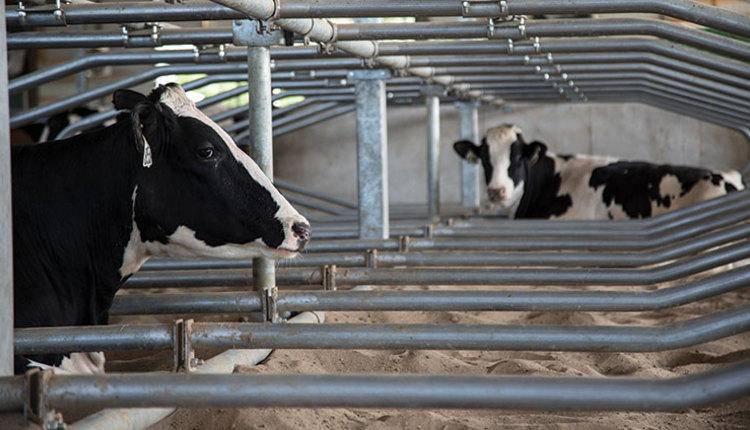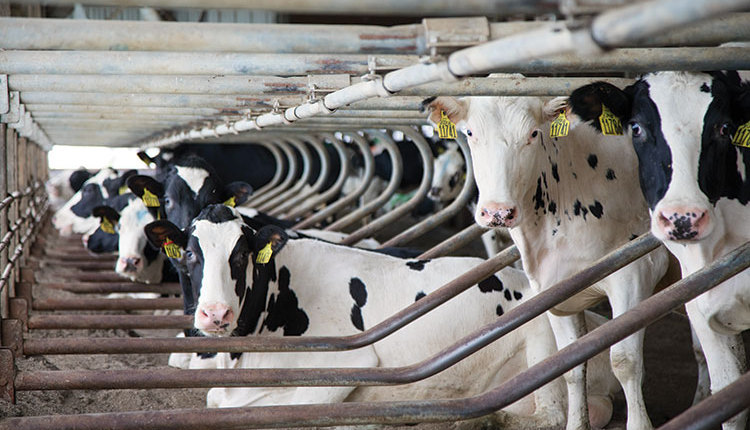The author is a large-herd veterinarian based in Jerome, Idaho.
In the movie "Patton," there is a famous opening scene where the accomplished four-star general, played by George C. Scott, is pacing in front of an enormous American flag. He delivers a blistering, motivational speech to the troops before a major battle.
The distinguished general, known for his temper and strict aura of command, addresses the troops in an inspiring, yet intimidating style. It is a compelling scene.
"Compliments are free. They don't cost a cent, yet judging by the stinginess with which they are doled out on many farms, they seem to be the most rare and precious thing on earth."
Who among us has not caught ourselves behaving in a similar fashion in front of our farm workers? Perhaps the outdoor crew has mixed the pens yet again, requiring a time-consuming inventory and chasing down of misplaced cows. Or maybe you've hired some new milkers and your somatic cell count has risen acutely.
Why not imitate Patton and whip the troops back into line? It is an enticing and flattering picture to contemplate: the troops (our farm employees) shaking in their barn boots, chastened and contrite, looking to us (management) with respect and humility for guidance. Unfortunately, despite the best of our intentions, instead of seeing Patton before the Battle of the Bulge, we ultimately come across as Hitler at the Nuremberg Rallies.
I've learned that once the shouting begins, the listening stops. Instead, to achieve effective communication and establish good rapport with our employees, we must remind ourselves that the modern dairy farm is not a battlefield, and the workers are not conscripted troops but instead are willing and voluntary free agents.
We all have tempers and limits to our patience. I am as guilty as anyone of having surpassed my threshold on occasion and dressed down my audience in a tirade. While it serves to vent steam and lower blood pressure on our part, in the eyes of our audience we are behaving as idiots. They will think, "What is that guy's problem?" It takes conscious effort to think and act positively, especially if it goes against our nature.
While we live in an imperfect world where mistakes are made daily, ranging from inconsequential to catastrophic, before flying off the cuff it is helpful to first step back and appraise the situation at hand. If the night cow pusher has mixed cow pens again, consider that the culprit may be unsuccessful multi-tasking brought about by unrealistic expectations.
The cow pusher may also be the night milker, maternity observer and hospital crew. If pens are getting mixed regularly, instead of immediately reading the crew the "riot act," first ask yourself some questions: Is there poor lighting at night? Is the pusher afraid of bulls in the pens? Or consider that, on a busy night of calving, it may be physically impossible for the milker to accomplish all his or her duties well.
Our people management skills can improve through a little introspection or self-examination. People are lumped or classed together in many ways. Those classified as optimists see the glass as half full, while the pessimists see it as half empty. It is similar with observational powers; some of us are natural, keen observers, others are not.
I am, by nature, both pessimistic and a poor observer. Ive found that I can improve both my observational powers and my view toward life by consciously fighting my nature and working to look at things more closely and in a positive light. It helps both me and the people with whom I interact if I nip negative feelings and attitudes in the bud and try to accentuate the positives in any given situation.
There is a saying that "you catch more flies with honey than vinegar." For an example, dairies can either reward positive behavior, such as paying a bonus based on a reduced somatic cell count, or assess a penalty for negative results, say when pens get mixed. In my experience, exacting penalties spawns poor morale.
Bonuses cost money, yet many dairies still pay them. One of the most effective long-term employee motivators, in my experience, is free, yet it is rarer on many dairies than the cow milking 200 pounds or the delivery of quadruplets.
"I've learned that once the shouting begins, the listening stops."
What is this scarce, precious commodity? It is the giving of a compliment. This mystifies me. Compliments are free. They don't cost a cent, yet judging by the stinginess with which they are doled out on many farms, they seem to be the most rare and precious thing on earth.
It is a sad fact, but the one word of encouragement and praise that I give to an employee on a farm visit may be the only positive comment they will receive all day. There seems to be a fear among employers that giving "too much" praise, if there can be such a thing, will lead the employees to expect greater compensation.
I think the person in charge, whether they be the owner or a supervisor, should recognize and view compliments for what they are: nonmonetary compensation. It is unlikely that an employee who is doing a good job and getting complimented for doing so will demand a raise. It is usually the other way around; people who feel unappreciated tend to also feel overworked and underpaid.
Good and profitable behavior can be rewarded in many different ways. Numerous studies show that bestowing a monetary raise only generates a temporary psychological boost. Lasting job satisfaction comes from feeling appreciated. The way to express appreciation includes giving deserving people a pat on the back, a kind word and public recognition. These gestures don't cost a cent, yet are invaluable as motivators and in boosting morale.
I recently attended a client's holiday party. The highlight of the celebration was a ceremony, conducted by the owner and his sons, where they honored their long-term employees with a bonus check depending on how many years they'd worked at the farm.
It would have been much easier for Don to just slip the extra check into the weekly pay envelope, but instead he chose to publicly reward and celebrate their employees' loyalty and good performance. Through this simple and warm gesture, the monetary bonus was amplified in incalculable ways.
Don's farm stands out amongst my clients due to its low staff turnover and the great attitude among his help. Certainly, once in a while there will be a flare-up of tempers and the air will be cleared, but this is preferable to keeping issues under wraps and allowing them to smolder. Day in and day out, the climate on Don's dairy is one of appreciation.
Please remember that it is not just your hired help who appreciates a positive word of thanks or gratitude from time to time. Chances are, your veterinarian quietly listens while you share your troubles on the farm or in your personal life. We commiserate with you and are genuinely interested, but often we have troubles and concerns of our own as well.
Yes, we charge you well, and you reciprocate by paying your bill on time, which we appreciate. But I ask that, once in a while, if it is not the current climate on your dairy, you try to say "thank you" to your loyal and hardworking help first, and then, if we deserve it, to us as well. It won't cost you a dime.
This article appears on page 746 of the November 2014 issue of Hoard's Dairyman.
In the movie "Patton," there is a famous opening scene where the accomplished four-star general, played by George C. Scott, is pacing in front of an enormous American flag. He delivers a blistering, motivational speech to the troops before a major battle.
The distinguished general, known for his temper and strict aura of command, addresses the troops in an inspiring, yet intimidating style. It is a compelling scene.
"Compliments are free. They don't cost a cent, yet judging by the stinginess with which they are doled out on many farms, they seem to be the most rare and precious thing on earth."
Who among us has not caught ourselves behaving in a similar fashion in front of our farm workers? Perhaps the outdoor crew has mixed the pens yet again, requiring a time-consuming inventory and chasing down of misplaced cows. Or maybe you've hired some new milkers and your somatic cell count has risen acutely.
Why not imitate Patton and whip the troops back into line? It is an enticing and flattering picture to contemplate: the troops (our farm employees) shaking in their barn boots, chastened and contrite, looking to us (management) with respect and humility for guidance. Unfortunately, despite the best of our intentions, instead of seeing Patton before the Battle of the Bulge, we ultimately come across as Hitler at the Nuremberg Rallies.
I've learned that once the shouting begins, the listening stops. Instead, to achieve effective communication and establish good rapport with our employees, we must remind ourselves that the modern dairy farm is not a battlefield, and the workers are not conscripted troops but instead are willing and voluntary free agents.
We all have tempers and limits to our patience. I am as guilty as anyone of having surpassed my threshold on occasion and dressed down my audience in a tirade. While it serves to vent steam and lower blood pressure on our part, in the eyes of our audience we are behaving as idiots. They will think, "What is that guy's problem?" It takes conscious effort to think and act positively, especially if it goes against our nature.
While we live in an imperfect world where mistakes are made daily, ranging from inconsequential to catastrophic, before flying off the cuff it is helpful to first step back and appraise the situation at hand. If the night cow pusher has mixed cow pens again, consider that the culprit may be unsuccessful multi-tasking brought about by unrealistic expectations.
The cow pusher may also be the night milker, maternity observer and hospital crew. If pens are getting mixed regularly, instead of immediately reading the crew the "riot act," first ask yourself some questions: Is there poor lighting at night? Is the pusher afraid of bulls in the pens? Or consider that, on a busy night of calving, it may be physically impossible for the milker to accomplish all his or her duties well.
Our people management skills can improve through a little introspection or self-examination. People are lumped or classed together in many ways. Those classified as optimists see the glass as half full, while the pessimists see it as half empty. It is similar with observational powers; some of us are natural, keen observers, others are not.
I am, by nature, both pessimistic and a poor observer. Ive found that I can improve both my observational powers and my view toward life by consciously fighting my nature and working to look at things more closely and in a positive light. It helps both me and the people with whom I interact if I nip negative feelings and attitudes in the bud and try to accentuate the positives in any given situation.
There is a saying that "you catch more flies with honey than vinegar." For an example, dairies can either reward positive behavior, such as paying a bonus based on a reduced somatic cell count, or assess a penalty for negative results, say when pens get mixed. In my experience, exacting penalties spawns poor morale.
Bonuses cost money, yet many dairies still pay them. One of the most effective long-term employee motivators, in my experience, is free, yet it is rarer on many dairies than the cow milking 200 pounds or the delivery of quadruplets.
What is this scarce, precious commodity? It is the giving of a compliment. This mystifies me. Compliments are free. They don't cost a cent, yet judging by the stinginess with which they are doled out on many farms, they seem to be the most rare and precious thing on earth.
It is a sad fact, but the one word of encouragement and praise that I give to an employee on a farm visit may be the only positive comment they will receive all day. There seems to be a fear among employers that giving "too much" praise, if there can be such a thing, will lead the employees to expect greater compensation.
I think the person in charge, whether they be the owner or a supervisor, should recognize and view compliments for what they are: nonmonetary compensation. It is unlikely that an employee who is doing a good job and getting complimented for doing so will demand a raise. It is usually the other way around; people who feel unappreciated tend to also feel overworked and underpaid.
Good and profitable behavior can be rewarded in many different ways. Numerous studies show that bestowing a monetary raise only generates a temporary psychological boost. Lasting job satisfaction comes from feeling appreciated. The way to express appreciation includes giving deserving people a pat on the back, a kind word and public recognition. These gestures don't cost a cent, yet are invaluable as motivators and in boosting morale.
I recently attended a client's holiday party. The highlight of the celebration was a ceremony, conducted by the owner and his sons, where they honored their long-term employees with a bonus check depending on how many years they'd worked at the farm.
It would have been much easier for Don to just slip the extra check into the weekly pay envelope, but instead he chose to publicly reward and celebrate their employees' loyalty and good performance. Through this simple and warm gesture, the monetary bonus was amplified in incalculable ways.
Don's farm stands out amongst my clients due to its low staff turnover and the great attitude among his help. Certainly, once in a while there will be a flare-up of tempers and the air will be cleared, but this is preferable to keeping issues under wraps and allowing them to smolder. Day in and day out, the climate on Don's dairy is one of appreciation.
Please remember that it is not just your hired help who appreciates a positive word of thanks or gratitude from time to time. Chances are, your veterinarian quietly listens while you share your troubles on the farm or in your personal life. We commiserate with you and are genuinely interested, but often we have troubles and concerns of our own as well.
Yes, we charge you well, and you reciprocate by paying your bill on time, which we appreciate. But I ask that, once in a while, if it is not the current climate on your dairy, you try to say "thank you" to your loyal and hardworking help first, and then, if we deserve it, to us as well. It won't cost you a dime.








